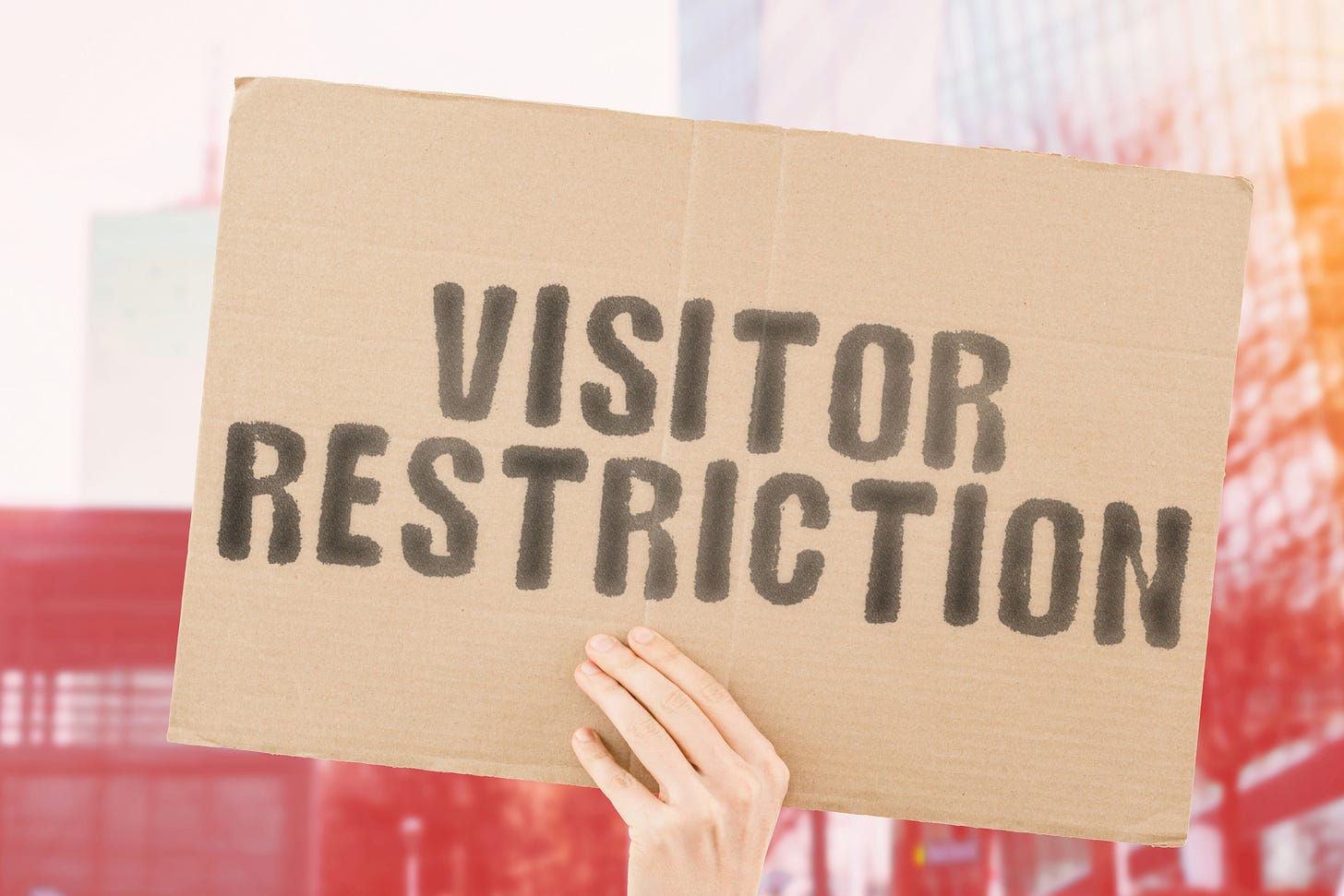So I spend a lot of my time inside a neonatal intensive care, a good bit behind a podcast mic, and whatever time left I splash pixels around as a digital artist. I’ve watched more “brand‑new baby” dramas than Netflix could ever stream, and the plot is always the same: people you love (and a few you merely tolerate) swarm you like seagulls on chips in O’Connell Street the minute the little one arrives. If you don’t set boundaries early, your postpartum period turns into an unplanned neighbourhood open house, complete with unsolicited advice, viral infections, and the odd relative who smells suspiciously of stale cigarettes. Hard pass.
So, grab a cuppa, park yourself somewhere comfy, and let’s talk, one parent to another about how to navigate in‑laws, eager friends, and the random punters who “just happen to be in the area.” We’re going to cover the why, the how, and the “what on earth do I say when Auntie Brenda rings the bell unannounced?” No legalese, no research citations, just real talk from someone who’s seen it all and occasionally stitches the fallout back together.
Why boundaries aren’t just polite: they’re medical
Imagine the neonatal unit. We don’t let visitors wander in because tiny immune systems are basically blank slates. Out in the wild, that principle still applies. RSV, influenza, the “harmless sniffle” your cousin swears is hay fever, each one can land your infant back in A&E faster than you can spell paracetamol. Setting firm rules isn’t being precious; it’s evidence‑based infection control. Add sleep deprivation to the mix and you’ve got a perfect storm. Newborn parents already feel as if they’re auditioning for a zombie thriller. Protecting your downtime is a matter of mental health. No one, including Granny, has a right to ring your doorbell at 7 a.m. “just to see the baby.” You are the gatekeeper, end of story.
Get on the same page before the baby even shows up
A good idea is to talk strategy before baby comes, not during the first cluster‑feed at 3 a.m. when you’re both delirious. Sit with your partner, brew a pot of tea, and answer three questions together. One, how many days of just‑us‑time do we want after the birth? Two, who gets priority for first visits and how long will those visits be? Three, what’s our polite but firm one‑liner when someone tries to deviate from the plan? Once you agree, lock it in. From that moment forward, you present a united front—like a two‑person rugby scrum protecting your tiny scrum‑half.
Craft the pre‑emptive strike message
Yes, I know sending a mass text feels corporate, but it works. Something casual: “Baby’s due mid‑June. We’re taking a few days to settle in and will shout when we’re ready for visitors. Thanks for the love, can’t wait for you to meet our littlest legend!” You’ve just set expectations without sounding like a bouncer. Screenshot it and keep it handy; you’ll need the receipts when someone claims “Oh, but I thought you wanted company.”
Designate the household bouncer
Every family needs one. If you birthed the baby, nominate your partner. The bouncer’s job is to filter calls, redirect uninvited guests, and generally say no so you don’t have to. Think of them as a friendly bodyguard. They answer the door in their cosiest hoodie, armed with a rehearsed line: “Hey, brilliant to see you, but today’s not great. Let’s lock in another time when mum and baby are rested.” Done. Nobody argues with the bouncer.
The hospital phase: visitor hours are not a suggestion
Irish maternity wards technically allow visitors, but that doesn’t mean you need to host. Tell the midwives you want limited access if you do. Many units will happily play gatekeeper in exchange for a smile and maybe a chocolate digestive. If someone still appears, you can always blame hospital policy: “Sorry, they’re super strict about germs this week; we’ll video‑call you later.” White lies carry zero karmic penalty when you’re protecting a newborn.
First week at home: play it like quarantine lite
Picture your house as a recovering Airbnb that hasn’t reopened yet. Keep curtains drawn, phones on silent, and doors locked unless you’ve scheduled a visit. When people do come, greet them with hand sanitiser like it’s the Eucharist. If they balk, blame me: “Our neonatologist friend insists—it’s practically a doctor’s order.” Voilà, conflict avoided.
The most magical phrase in your vocabulary is “let me check how tonight’s going first.” It buys you hours, sometimes days, of reprieve. Text it, say it, tattoo it on your forearm if you must.
Handling the in‑laws without triggering World War Three
Let’s address the elephant (sometimes mother‑in‑law) in the room. The golden rule is simple: each partner handles their own parents. It avoids triangulation and resentment. You might say, “Mam, we adore how excited you are and we can’t wait for weekly cuddles, but we’re keeping visits to lunchtime only for the first fortnight because the evenings are chaos.” Notice the structure: first validate, then set the rule, finish with a positive. It’s diplomacy, not war.
If you hit resistance, occasionally declared as “But that’s not how we did it in my day!” lean on the medical card. Mention health visitor recommendations, mention your fragile mental wellness, mention whatever credible excuse you need. Most grandparents cave when they realise you’re not just being trendy; you’re trying to keep their grandchild out of hospital.
Friends and neighbours: keep, trade, or punt?
You’ll quickly learn there are three categories of visitor. The keepers arrive with lasagne or offer to fold laundry while you nap. They can stay. The traders come with coffee and expect baby cuddles in return; allow them, with limits. Then there are the punters—folk who bring nothing but their curiosity. Give them a future date when the baby’s had immunisations and your living room no longer smells like sudocrem.
When a punter says, “Can I do anything?” don’t shrug politely. Hand them a broom or a shopping list. The good ones will rise to the challenge and graduate to trader status. The rest will suddenly “have something on” and leave you in peace. Either outcome is a win.
Social‑media landmines and the art of the soft ban
We’re living in a world where a stroller photo can be screenshotted thirty times before breakfast. Decide, with your partner, what baby content—if any—makes it online. Once you’re clear, tell people plainly: “We’re not posting pics for now, so please keep any snaps just for yourself.” Most comply. The rogue who ignores you gets downgraded to digital‑distance friend for a while. Consequences teach faster than lectures.
What to say when someone “just pops by”
Picture the doorbell rings. You peek through the blinds: it’s Cousin Declan, grinning and holding a present wrapped in sparkly paper. Baby is cluster‑feeding; you’re wearing yesterday’s pyjamas. Deep breath. Crack the door three inches and channel your inner concierge: “Declan, you legend! We’re mid‑feed and the place is a bomb site. Can we park this to next Tuesday? We’d love a catch‑up then.” Smile, look remorseful, close door. Ninety‑five percent of people back off. The remaining five percent require the full bouncer treatment.
The guilt monster: why it shows up and how to chase it out
Guilt feeds on exhaustion. You’re tired, hormonal, and learning to keep a small human alive. When someone’s disappointed by your boundary, guilt whispers, “Maybe I am overreacting.” That’s nonsense. Repeat after me: I am not a public monument; I am a recovering parent with a vulnerable infant. If you need more reinforcement, imagine the same scenario happening to your best friend. Would you tell her to stop fussing and let the neighbours handle the baby? Exactly.
When boundaries get bulldozed
It happens. An in‑law refuses hand sanitiser or a friend shows up uninvited twice in one week. First offence: remind politely. Second offence: get blunt “I really need you to call first. We’re trying to protect the baby’s health and my mental load.” Third offence: consequence. Maybe visits pause for a fortnight. People learn fastest when there’s a clear cause and effect.
The long game: revisiting and revising the rules
Boundaries aren’t carved in stone; they’re pencilled in like an evolving sketch. Once the six‑week jabs are done, you might loosen visitor restrictions. When you hit the four‑month mark and your child can finally hold their head up without wobbling like a nodding dog, you might feel ready for bigger gatherings. Check in with each other weekly and ask, “Is this still working?” If yes, carry on. If no, adjust. Simple.
Don’t forget your own oxygen mask
An exhausted parent is a short‑tempered parent, and nothing erodes boundaries quicker than sheer fatigue. Tag‑team naps, binge brain‑fluff telly, go for a ten‑minute solo walk along the canal, whatever tops up your tank. Also, detach from your phone now and then. The world won’t implode if you miss a WhatsApp ping.
When you’re tempted to “be polite” at the expense of sleep, replay this scene in your head: you, weeping quietly at 3 a.m. while pacing the hallway with a colicky baby, because earlier that evening you let someone overstay their welcome. Burn that memory in advance and use it as fuel to say “Sorry, not today.”
Bringing everyone back together
Here’s the thing: boundaries aren’t about pushing people out forever. They’re about timing and conditions. Once visitors follow your rules, you’ll actually enjoy having them. They’ll bring stories, help, and the sense of community Irish culture thrives on. By being clear from day one, you guarantee those visits happen on your terms instead of in the middle of a cluster‑feed meltdown.
Parting words and a friendly ask
You’ve just inhaled roughly two thousand words of boundary gospel, and if you’ve made it this far you clearly value your peace as much as I do. Remember: you only get one newborn period per child. Guard it like the treasure it is. The people who truly love you will adapt; the ones who don’t were never going to change a nappy anyway.
If you found this little manifesto helpful—or if you’ve got your own tales of in‑law invasion—come find me online. Every follow lets me keep pumping out science‑laced sanity with a side of dark humour. Catch the podcast The Baby Tribe on all major platforms every Tuesday, stalk my digital‑art‑meets‑medicine madness on Instagram (@afif.elkhuffash). Your newborn will sleep eventually; my content’s waiting whenever that blessed nap window opens.
Sláinte, my friend. Now go grab that nap while the house is still quiet, and may your doorbell stay silent until you say otherwise.








This is brilliant, we're a mere 8 weeks away from due date and this particular subject was making me nervous!